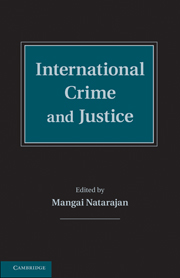Book contents
- Frontmatter
- Contents
- List of Figures
- List of Tables
- List of Contributors
- Foreword
- Preface
- Introduction
- Part I International Criminology
- Part II Law, Punishment, and Crime Control Philosophies of the World
- Part III Transnational Crime
- Part IV Organized Crime and Terrorism
- 30 Transnational Organized Crime
- 31 The Rise of Balkan Organized Crime
- 32 Russian Organized Crime
- 33 The Italian Mafia
- 34 Extortion and Organized Crime
- 35 Organized Crime in Asia
- 36 Drug Cartels
- 37 The International Implications of Domestic Terrorism in the United States
- 38 Terrorism
- Part V International crime
- Part VI Delivering International Justice
- Part VII International Cooperation and Criminal Justice
- Part VIII International Research and Crime Statistics
- Part IX International research resources
- World Map
- Index
- References
35 - Organized Crime in Asia
Published online by Cambridge University Press: 05 October 2014
- Frontmatter
- Contents
- List of Figures
- List of Tables
- List of Contributors
- Foreword
- Preface
- Introduction
- Part I International Criminology
- Part II Law, Punishment, and Crime Control Philosophies of the World
- Part III Transnational Crime
- Part IV Organized Crime and Terrorism
- 30 Transnational Organized Crime
- 31 The Rise of Balkan Organized Crime
- 32 Russian Organized Crime
- 33 The Italian Mafia
- 34 Extortion and Organized Crime
- 35 Organized Crime in Asia
- 36 Drug Cartels
- 37 The International Implications of Domestic Terrorism in the United States
- 38 Terrorism
- Part V International crime
- Part VI Delivering International Justice
- Part VII International Cooperation and Criminal Justice
- Part VIII International Research and Crime Statistics
- Part IX International research resources
- World Map
- Index
- References
Summary
INTRODUCTION
Triads and bryokudan are two major kinds of criminal organizations in Asia. Triads originated in China but have spread to many major Southeast Asian countries, such as Hong Kong, Taiwan, Singapore, Malaysia, and Indonesia. Boryokudan are criminal organizations in Japan. Their members, boryokudanin, are informally referred to as yakuza. In recent decades, triads and boryokudan have established bases in the United States and Europe. This chapter provides an account of the origin and modern-day operation of triads and boryokudan, and a description of the context that supports the growth of these organizations.
THE ORIGIN OF THE TRIADS
Triads initially emerged to fill a need in society, providing services and protection that were unavailable or hard to obtain from the government. Members of these groups occupied a marginal status in society. They were often outcasts or lost their social status due to changes in the social system. Gradually, they expanded and began to “sell” protection to others who needed it. Lacking legitimate means, they resorted to violence and intimidation to protect themselves and their customers. Due to the nature of their business, triads have many opportunities to engage in illegal activities. Criminal activities are also a good source of power and profits to sustain these organizations.
- Type
- Chapter
- Information
- International Crime and Justice , pp. 268 - 275Publisher: Cambridge University PressPrint publication year: 2010



